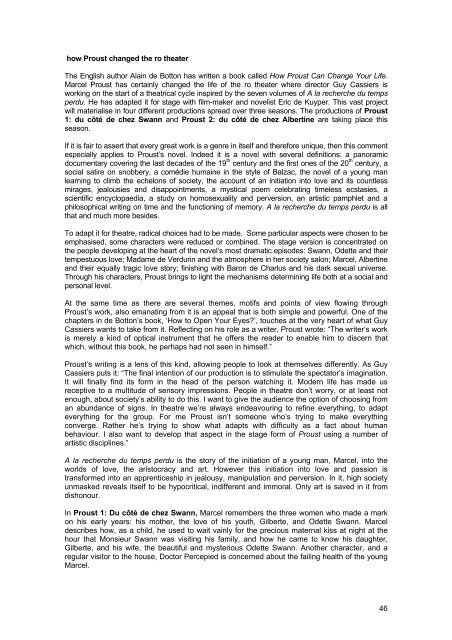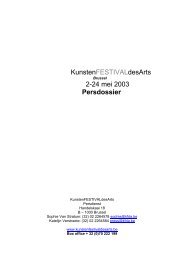Press File - Kunstenfestivaldesarts
Press File - Kunstenfestivaldesarts
Press File - Kunstenfestivaldesarts
Create successful ePaper yourself
Turn your PDF publications into a flip-book with our unique Google optimized e-Paper software.
how Proust changed the ro theater<br />
The English author Alain de Botton has written a book called How Proust Can Change Your Life.<br />
Marcel Proust has certainly changed the life of the ro theater where director Guy Cassiers is<br />
working on the start of a theatrical cycle inspired by the seven volumes of A la recherche du temps<br />
perdu. He has adapted it for stage with film-maker and novelist Eric de Kuyper. This vast project<br />
will materialise in four different productions spread over three seasons. The productions of Proust<br />
1: du côté de chez Swann and Proust 2: du côté de chez Albertine are taking place this<br />
season.<br />
If it is fair to assert that every great work is a genre in itself and therefore unique, then this comment<br />
especially applies to Proust’s novel. Indeed it is a novel with several definitions: a panoramic<br />
documentary covering the last decades of the 19 th century and the first ones of the 20 th century, a<br />
social satire on snobbery, a comédie humaine in the style of Balzac, the novel of a young man<br />
learning to climb the echelons of society, the account of an initiation into love and its countless<br />
mirages, jealousies and disappointments, a mystical poem celebrating timeless ecstasies, a<br />
scientific encyclopaedia, a study on homosexuality and perversion, an artistic pamphlet and a<br />
philosophical writing on time and the functioning of memory. A la recherche du temps perdu is all<br />
that and much more besides.<br />
To adapt it for theatre, radical choices had to be made. Some particular aspects were chosen to be<br />
emphasised, some characters were reduced or combined. The stage version is concentrated on<br />
the people developing at the heart of the novel’s most dramatic episodes: Swann, Odette and their<br />
tempestuous love; Madame de Verdurin and the atmosphere in her society salon; Marcel, Albertine<br />
and their equally tragic love story; finishing with Baron de Charlus and his dark sexual universe.<br />
Through his characters, Proust brings to light the mechanisms determining life both at a social and<br />
personal level.<br />
At the same time as there are several themes, motifs and points of view flowing through<br />
Proust’s work, also emanating from it is an appeal that is both simple and powerful. One of the<br />
chapters in de Botton’s book, ‘How to Open Your Eyes?’, touches at the very heart of what Guy<br />
Cassiers wants to take from it. Reflecting on his role as a writer, Proust wrote: “The writer’s work<br />
is merely a kind of optical instrument that he offers the reader to enable him to discern that<br />
which, without this book, he perhaps had not seen in himself.”<br />
Proust’s writing is a lens of this kind, allowing people to look at themselves differently. As Guy<br />
Cassiers puts it: “The final intention of our production is to stimulate the spectator’s imagination.<br />
It will finally find its form in the head of the person watching it. Modern life has made us<br />
receptive to a multitude of sensory impressions. People in theatre don’t worry, or at least not<br />
enough, about society’s ability to do this. I want to give the audience the option of choosing from<br />
an abundance of signs. In theatre we’re always endeavouring to refine everything, to adapt<br />
everything for the group. For me Proust isn’t someone who’s trying to make everything<br />
converge. Rather he’s trying to show what adapts with difficulty as a fact about human<br />
behaviour. I also want to develop that aspect in the stage form of Proust using a number of<br />
artistic disciplines.”<br />
A la recherche du temps perdu is the story of the initiation of a young man, Marcel, into the<br />
worlds of love, the aristocracy and art. However this initiation into love and passion is<br />
transformed into an apprenticeship in jealousy, manipulation and perversion. In it, high society<br />
unmasked reveals itself to be hypocritical, indifferent and immoral. Only art is saved in it from<br />
dishonour.<br />
In Proust 1: Du côté de chez Swann, Marcel remembers the three women who made a mark<br />
on his early years: his mother, the love of his youth, Gilberte, and Odette Swann. Marcel<br />
describes how, as a child, he used to wait vainly for the precious maternal kiss at night at the<br />
hour that Monsieur Swann was visiting his family, and how he came to know his daughter,<br />
Gilberte, and his wife, the beautiful and mysterious Odette Swann. Another character, and a<br />
regular visitor to the house, Doctor Percepied is concerned about the failing health of the young<br />
Marcel.<br />
46






